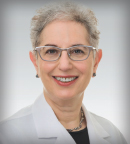The autologous chimeric antigen receptor (CAR) T-cell therapy tisagenlecleucel failed to improve event-free survival vs standard-of-care treatment strategies in patients with aggressive, relapsed or refractory non-Hodgkin lymphoma (NHL), according to the results of the phase III BELINDA trial, presented as a late-breaking abstract during the 2021 American Society of Hematology (ASH) Annual Meeting & Exposition.1 According to the investigators, it appears that the lag between randomization and the receipt of CAR T-cell infusion may have led to the disappointing results.

Michael R. Bishop, MD
“A higher proportion of patients in the tisagenlecleucel arm had progressive disease at week 6 prior to CAR T-cell infusion. Our findings suggest the importance of preventing progressive disease prior to CAR T-cell infusion,” said lead investigator Michael R. Bishop, MD, Professor of Medicine and Director of the Hematopoietic Stem Cell Transplantation Program at the University of Chicago Medicine.
“A strong possibility is that the pace of the aggressive NHL outpaces the ability of the CAR T cells to eliminate it. From a simple point of view, the progression of the disease is such that it may exceed the ability of the CAR T cells to work. There does appear to be a dose-response relationship, which may play an important role in this disease,” Dr. Bishop said.
“We knew this aggressive NHL did not respond to first-line chemotherapy or relapsed quickly. The biology of this disease is different from that of other lymphomas, which relapse further down the line,” he explained.
“The study was designed to look at a specific patient population beyond approval for tisagenlecleucel, which is a second-line treatment. These patients have aggressive disease and a historically poor prognosis. The standard of care is to take them to second-line therapy and autologous stem cell transplantation. Less than 40% will have disease that is still sensitive, so less than 60% are eligible for transplantation. There is an unmet need for treatments with better outcomes,” he continued.
Nevertheless, lessons learned from the trial are very important, according to Dr. Bishop. “The results show that the standard of care is equivalent to tisagenlecleucel, and we were extremely disappointed, as this was not what was expected. However, many things can be learned from a negative trial that can inform the design of future CAR T-cell trials, and that’s why these findings are important,” Dr. Bishop said.
Takeaways From BELINDA
The results of CAR T-cell trials have been promising in most hematologic malignancies. Dr. Bishop noted that the type of NHL included in this trial is “probably a more aggressive disease than in cases where CAR T cells have been beneficial.”
The trial design included a primary endpoint of event-free survival, which was assessed only beyond 12 weeks from randomization. In the standard-of-care arm, patients could receive multiple lines of salvage chemotherapy, Dr. Bishop pointed out.
Perhaps the most important factor was the extended interval between randomization and when patients were administered CAR T cells, approximately 50 days later. “This is a relatively long time with such an aggressive disease and may explain why the treatment was not superior. By the time patients received the CAR T-cell infusion, the opportunity for benefit may have been lost,” he noted.
Dr. Bishop emphasized that there was a correlation between patients who did not respond to bridging therapy and those with further progressive disease and stable disease. “These patients appeared to do worse than those who responded to chemotherapy,” he noted.
“BELINDA provides data for researchers to learn from for the further design of CAR T-cell trials in this population of patients with aggressive NHL. People want to understand why the trial failed and the biology of how CAR T cells work. This was a significant surprise to all investigators and the general lymphoma community,” Dr. Bishop stated.
Study Details
Tisagenlecleucel is an autologous anti-CD29 CAR T-cell therapy approved for relapsed or refractory diffuse large B-cell lymphoma treated with two or more prior lines of treatment.
The global, randomized, phase III BELINDA trial compared the safety of tisagenlecleucel with the current second-line standard-of-care treatment strategy in 322 patients with aggressive relapsed or refractory NHL within 12 months of first therapy who were eligible for autologous hematopoietic cell transplantation (AHCT). They were randomly assigned 1:1 to the standard of care (n = 160) vs tisagenlecleucel infusion (n = 162). Patients in the standard-of-care arm were given bridging chemotherapy as needed. Stratification factors included geographic region (United States vs non–United States), relapsed or refractory disease status (within 6 months vs 6–12 months), and International Prognostic Index score (< 2 vs ≥ 2).
The data cutoff was May 6, 2021. Patients were followed at weeks 6 and 12 and thereafter every 3 months until 12 months; every 6 months until 24 months; and annually to 60 months.
Baseline characteristics were well balanced between the two arms, with the exceptions of more high-grade B-cell lymphoma and more older patients in the tisagenlecleucel arm. Median time from initial diagnosis to randomization was almost identical in the two arms: 8.4 months with tisagenlecleucel and 8.2 months with the standard of care.
The primary endpoint was event-free survival. Secondary endpoints were overall survival, objective response rate, and safety.
Major Outcomes
At a median follow-up of 10 months, 83.3% of the tisagenlecleucel arm received bridging therapy and 95.7% continued on tisagenlecleucel. In the standard-of-care arm, 32.5% underwent AHCT, and an additional 10% were able to have AHCT after a second platinum-containing chemotherapy. A total of 81 patients crossed over to tisagenlecleucel from the standard of care.
In the tisagenlecleucel arm, 36% received one cycle of platinum-based chemotherapy, and 48% had more than one cycle. In the standard-of-care arm, 97% received one cycle, and 54% of them had a second cycle. The overall time to infusion for tisagenlecleucel was 52 days: 41 days in the U.S. population and 57 days in the non-U.S. population.
The primary endpoint was not met. Event-free survival was identical in the two arms: a median of 3 months. Among those assigned to treatment with tisagenlecleucel, patients with a complete response had the best outcome: event-free survival was a median of 9.2 months, whereas those with progressive disease and stable disease had a median of 12 months and 1.6 months, respectively. The highest rate of event-free survival was observed in those with primary mediastinal B-cell lymphoma: a median of 4.7 months.
At week 6, the objective response rate was 62% in the tisagenlecleucel arm vs 86% in the standard-of-care arm. The best overall objective response for all assessments was 46.3% and 42.5%, respectively. At week 6, progressive disease was observed in 25.9% of the tisagenlecleucel arm vs 13.8% of the standard-of-care arm.
While on study, 32.1% and 28.1% of patients died, respectively. Deaths were due to progressive disease in 25.9% and 20%, respectively, and to adverse events in 6.2% and 8.1%, respectively.
The most common hematologic adverse events in both arms were anemia, thrombocytopenia, and neutropenia. In the tisagenlecleucel arm, the rate of cytokine-release syndrome was 58.6%, with 4.9% grade 3 or higher. Neurologic events occurred in 10.3%, with grade 3 or higher in 1.9%.
DISCLOSURE: Dr. Bishop has served as a consultant to and received research funding from Arcellx, Autolus Therapeutics, Bristol Myers Squibb, CRISPR, Kite/Gilead, and Novartis; and has received fees for non-CME/CE services from Bristol Myers Squibb and Kite/Gilead.
REFERENCE
1. Bishop M, Dickinson M, Purtill D, et al: Tisagenlecleucel vs standard of care as second-line therapy of primary refractory or relapsed aggressive B-cell non-Hodgkin lymphoma: Analysis of the phase III BELINDA study. 2021 ASH Annual Meeting & Exposition. Abstract LBA-6. Presented December 14, 2021.


